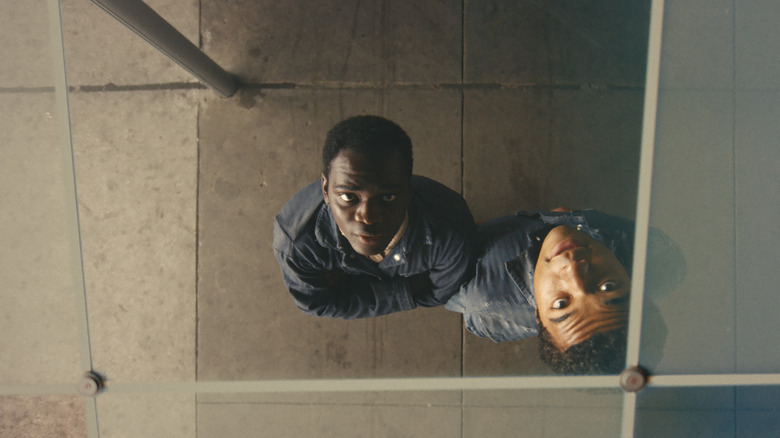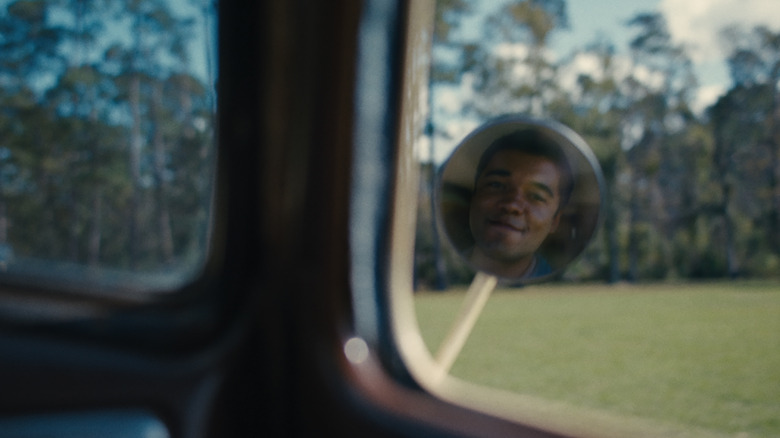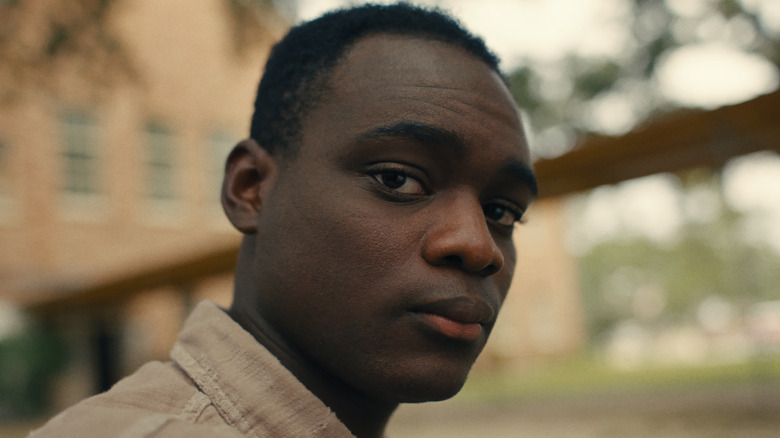Nickel Boys Review: A Breathtaking, Unique Film That Will Leave You Stunned
Hyperbole can be an issue when writing about films. For the most part, I don't think those who traffic in gushing, pull-quote ready words of praise do so inauthentically. I simply think it's very easy to get excited about a movie, especially when that movie is good. Still, it's necessary to be realistic, just as it is to be honest. Yet every now and then, a movie comes along that warrants the most effusive praise possible. I'm telling you all of this so you understand where I'm coming from when I say that RaMell Ross' "Nickel Boys" is unlike any movie you've ever seen before. Ross has somehow invented a distinct, unique, and fresh cinematic language for his adaptation of Colson Whitehead's Pulitzer Prize-winning novel "The Nickel Boys," creating a film that feels like an actual memory plucked straight from someone's mind. Dream-like, harrowing, beautiful, stunning; all these words came to mind as I watched Ross' heartbreaking, powerful drama. If this isn't one of the very best films of the year, then what is? I've seen some folks refer to 2024 as a weak year for film, but no year that features "Nickel Boys" can be considered weak.
Ross' film, like Whitehead's novel, is inspired by the real-life Arthur G. Dozier School for Boys, a brutal Florida reform school that had a ghastly reputation for both abusing and murdering the boys and young men confined within, operating unchecked for over 111 years (it was finally shut down in 2011). Knowing that, you might expect "Nickel Boys" to be an unrelenting, brutal story of abuse and pain. Indeed, there is abuse here, but Ross films it in an abstract way that doesn't focus on the physical violence so much as it conjures up the sensorial experience of the moment — the sounds, the darkness of a room, the sense of surreal unreality washing over everything. That sensorial experience is present in nearly every frame of "Nickel Boys," primarily due to the unconventional way Ross and Jomo Fray present the film: almost the entirety of "Nickel Boys" is shot in first-person point-of-view.
"Nickel Boys" isn't the first movie to take this approach. The silly "Hardcore Henry" used it to show its action hero laying waste to everyone in his path like a video game character, and Robert Montgomery's Raymond Chandler movie "Lady in the Lake," from 1947, also employed a first-person POV approach to get us inside the head of main character Phillip Marlowe. Steven Soderbergh's ghost story "Presence," due out next year, also takes a similar approach. Even when used well, this can feel like a gimmick; a flashy bit of showmanship. But it never feels that way in "Nickel Boys." Instead, it feels as if we're being fully immersed in the experience of the film's two main characters as the film pivots its POV between them, and more of the bigger picture becomes clear.
Nickel Boys switches back and forth between two POVs
As "Nickel Boys" begins, we're dropped directly into the early days of a young Black boy named Elwood, living in Tallahassee, Florida with his beloved grandmother (Aunjanue Ellis-Taylor). Ross has us drifting through Elwood's youth as we look out through his eyes, seeing what he sees: flowers in a field, hands clutching each other, a sheet billowing down from above as a bed is being made, a lively Christmas celebration. It feels like a photo album come to life, and immediately acclimates us to the cinematic rhythm Ross is creating. Eventually, this opening montage settles into a more standard narrative flow. It's 1962, and Elwood, now a young man (played by Ethan Herisse, although it will be a while before we actually get a good look at him) is intelligent and kind, becoming involved with the Civil Rights movement in any way he can while also dreaming of college. When Elwood's supportive high school teacher Mr. Hill (Jimmie Fails) tells him of a school that will accept him, tuition-free, Elwood is ecstatic.
But Elwood will never reach that school. On what's supposed to be his first day, he accepts a ride from a stranger. The car turns out to be stolen, and while Elwood clearly had nothing to do with its theft, and even though his grandmother manages to get him a lawyer to mount his defense, he's still sent away to Nickel Academy, a segregated reform school with a set of rules doled out by Spencer (Hamish Linklater), the administrator who always seems vaguely threatening even when saying mundane things. In Spencer's own words, the boys of Nickel Academy work their way up, starting out as lowly "Grubs" and gaining more privileges based on their behavior.
It's at Nickel that Ross pulls off something akin to a magic trick, suddenly switching the film's POV. In one scene, as we're still looking out from Elwood's eyes, we watch as he sits down in the mess hall for lunch and is mocked by other boys at his table. But one of the boys, a calm, cool young man named Turner (Brandon Wilson), is surprisingly kind to Elwood, and we can tell these two will become friends; it's almost destiny. Then, in the blink of an eye, we watch the same scene play out again — only this time, the POV has switched to Turner's eyes. Up until now, we've only really glimpsed Elwood's face vaguely, through reflections in windows or, when he's younger, in his grandmother's steam iron. Now, we're finally seeing Elwood's sad face, a decision that has the effect of a key unlocking something, opening up a whole new world.
As the film moves forward, Ross frequently jumps back and forth from the perspective of Elwood and Turner, and we come to feel as if we've known both of these young men all our lives. They never once feel like characters in a film; they are alive for us. They also are two very different people. Despite his circumstances, Elwood continues to dream of life beyond Nickel. Turner, however, has already been in Nickel once before, and has no such dreams. I wouldn't call him "defeated," but he's adopted a worldview that assumes nothing will ever improve; that life is a series of ups and downs, and the downs tend to win out. And yet, despite their vastly contradictory worldviews, these two souls find a home in each other's hearts, and we want only good things for them, even though we know that their very situation implies that good things are impossible.
We are lucky to have Nickel Boys
As "Nickel Boys" unfolds at a leisurely but never boring pace, Ross finds new ways to upend traditional storytelling. Not only does the film keep moving back and forth between the POVs of Elwood and Turner as they inhabit Nickel in the 1960s, but it also jumps forward in time. Ross additionally intercuts other forms of media, like videos that appear to be taken straight from YouTube as well as scenes from other films, like the 1958 Tony Curtis and Sidney Poitier movie "The Defiant Ones." While this mixed-media approach surely could've backfired in the wrong hands, Ross' direction is assured and wholly engrossing, fully pulling us into the inner worlds of its two protagonists.
Life at Nickel can be brutal, but "Nickel Boys" still manages to find a sense of beauty in the world. One of the most emotionally wrenching moments arrives when Elwood's grandmother visits one day. Elwood, having been brutally beaten by Spencer for daring to defend another bullied kid, is recuperating in the infirmary, and his grandmother is told she can't see him. Instead, she just happens to run into Turner, who tells her he knows her grandson. She replies that since she can't hug Elwood, Turner will have to do, and the camera, representing Turner, moves in close, pressing up against this woman as we hear the rustle of her fabric. In theory, this is a simple moment — a hug between strangers. But the way Ross and cinematographer Fray shoot it gives it an almost elemental power; I'm getting choked up just thinking about it.
"Nickel Boys" is loaded with little earth-shattering moments like that; moments that you can feel deep down in your chest. The film manages to create a legitimately physical reaction in the viewer. By the time the absolutely stunning final shot arrived, I felt the air rushing from my lungs, as if the wind had been knocked out of me. For all its heartbreak, for all its pain, "Nickel Boys" is a staggeringly beautiful film. You don't simply watch it; you experience it. This is a major work of art, and we are lucky to have it.
/Film Rating: 10 out of 10
"Nickel Boys" opens in select theaters on December 14, 2024.


